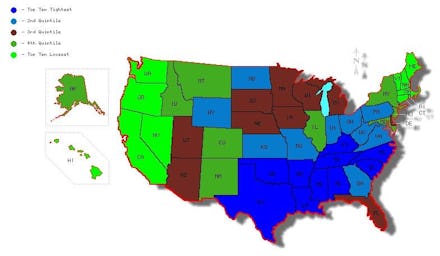Psychologists Studied the Most Uptight States in America, and Found a Striking Pattern

Source: Mother Jones
When a recent research study concluded that California is the most "loose" state in America, it wasn't implying a character flaw for Californians. Instead, the "Tightness-Looseness" study of 50 states in United States by University of Maryland academics refers to the states' government and population responses to various factors, including social structure, tolerance, laws and their enforcement.
Psychologists Jesse R. Harrington and Michele J. Gelfand tried to understand the complicated and intertwined relationships between different cultural, political beliefs and practices of people and the state to which they belong, using the results to label states as either tight or loose.
"Finding a singing cowboy playing the guitar in his underwear may indeed be a hard thing to find outside of New York City," the authors write.
According to the study, states with strict regulations in their communities — such as dry counties, frequent death penalty sentences, strict school discipline and gay marriage bans — are "tight." Everything from the numbers of cops per capita to rates of substance use to the availability and access to booze, were considered when classifying some states as "tighter" — meaning "strongly enforced rules and little tolerance for deviance" — than their "loose" neighbors, in this case meaning states with "greater tolerance for deviance."
Image Credit: University of Maryland
Social issues played a large part in the rankings, with "tighter" states appearing more likely to allow various controversial or discriminatory practices, versus "looser," more socially tolerant states with progressive stances on topics such as gay marriage.
Interestingly, the study also takes into account factors harder to control, such as "a greater number of ecological and historical threats, including fewer natural resources, more natural disasters, a greater incidence of territorial threat, higher population density and greater pathogen prevalence."
Harrington and Gelfand believe that their study may help analyze the regional cultural differences that translate into political loyalties. Indeed, the study found that tighter states are primarily in the South and the Midwest while looser states are located mostly in the Northeast, West Coast and some of the Mountain States.
While not creating any definitive links yet, the results do make sense from an ecological and historical perspective. Liberal America's Rob Groce pointed out a pattern in the rankings that tracks fairly neatly with the electoral results from the last few presidential elections. According to Groce, it's no coincidence that the Northeast and West regions that elected President Barack Obama easily also generally fall into the loose category, while the more Republican-loyal South is clearly tight.
It's not a perfect comparison, of course. Aberrations include the GOP stronghold state of Alaska(11th loosest) and Democratic-leaning Delaware, which are more tight. The researchers likewise acknowledge that there could be contradictions within the state — Louisiana is a tight state, but New Orleans may be a fairly loose city, while loose state California is actually riddled with tight counties.
"Now correlation does not equal causation," the Washington Post's Chris Cillizza notes. "But, it's still a fascinating way to analyze the cultural and political currents at work in the country."
Image Credit: University of Maryland